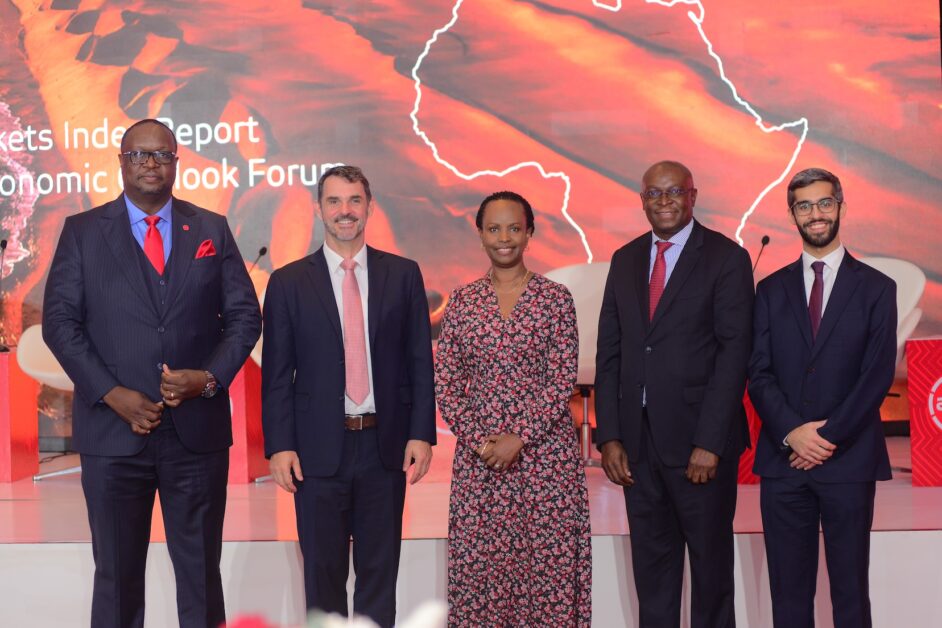With an overall score of 62.8, Uganda maintained its fourth position out of the 28 African countries measured under the 2023 Absa Africa Financial Market Index (AFMI) – a report that evaluates the financial development of countries with an overall aim of reducing the barriers to investment and boosting sustainable growth.
The 2023 report was released early on Tuesday during the 2024 Economic Outlook Forum hosted by Absa Bank Uganda at the Kampala Sheraton Hotel – bringing together investors and experts from both the public and private sectors.
According to the index, within Africa, Uganda ranks behind only South Africa – with an overall score of 88, Mauritius (77), and Nigeria (67).
Within East Africa, Uganda presented the highest-growing financial sector – scoring above Kenya (59), Tanzania (55), Rwanda (44), and the Democratic Republic of Congo (35).
While addressing guests during the forum, Mumba Kalifungwa, Absa Bank Uganda’s Managing Director, said, “2023 was indeed a tough year but Uganda’s economy remained resilient in spite of challenges facing the global economy including high inflation and slower growth prospects. At Absa, we believe that financial markets are vital to Africa’s growth providing an opportunity to tap into domestic capital but also be better positioned to access global capital.”
Uganda’s ranking in the report has improved from tenth position when the report was first released in 2017; to fifth in 2021; then fourth in 2022 – a position that was maintained in 2023.

Now in its seventh year, the AFMI has become an essential tool for investors and Policymakers, providing insights into the performance of financial markets across the continent.
The Deputy Governor Bank of Uganda Michael Atingi-Ego said such indices provide global visibility gov’t securities attracting more offshore investments which should, in theory, eventually lower the Gov’t’s borrowing costs.
He added that he was pleased that Uganda maintained its ranking of being the first in East Africa and fourth in Africa because Uganda’s economy like many others was adversely affected by the COVID-19 pandemic and the effects of the Russia- Ukraine war, which resulted in global supply chain disruptions.
“The resulting global supply chain put pressure on domestic inflation in the second half of 2022 and the higher interest rates caused liquidity tightness, effectively disrupting access to financial resources. However, the Bank of Uganda’s macroeconomic and macroprudential policy measures have shielded the domestic economy and the financial system from completely passing through external shocks,” said Atingi-Ego.
The Deputy Governor noted that despite Uganda’s improvements in numerous areas, the country is still plagued by the extremely low capacity of local investors, characterised by pension assets per capita of only about USD125.

“This has adversely affected our performance under Pillar 4: “Capacity of Local Investors”, with a score of just 14%. We, therefore, recognise the need for further pension sector reforms to ensure that pension assets are invested in the real sector of domestic economic growth,” he concluded.
Atingi-Ego added that arising out of the implementation of the National Financial Inclusion Strategy 2017-2022, Uganda has experienced increased access to financial services by the wider population through the proliferation of mobile financial services and products. In the year 2023 alone, the values of insurance and micro-savings amounted to UGX 3.4 billion and UGX 527.9 billion, respectively, while the value of microloans disbursed amounted to UGX 1.2 trillion.
The Ministry of Finance Commissioner Financial Services Moses Ogwapus, who represented Permanent Secretary/Secretary to Treasury Ramathan Goobi said the Ministry has a comprehensive capital markets reform that is expected to spur the growth and depth of the capital markets including the Uganda Fixed Income Market Committee and a Cabinet Memo, that is under consideration by Cabinet.
The AFMI Report 2023
According to the report Uganda’s Absa Africa Financial Markets Index score declined to 62.8 in 2023, from 64.4 the year before, though the country maintained its fourth-place position in the index.
The decrease was mostly driven by weaker performance in Pillar 2: Access to Foreign Exchange, in which its score fell by 10 points to 67 due to relatively lower scores for interbank FX turnover and international reserves adequacy. Reserves declined by almost 18% to USD 3.6 bn in 2022, equivalent to 3.4 months of imports, from 4.6 months a year prior.

Uganda fared better in Pillar 5: Macroeconomic Environment and Transparency, where the score rose by 1 point to 86 and the country retained its second-place position. The improvement was driven by the small fall in external debt to 26.8% of gross domestic product in 2022, from 27.7% in 2021. Meanwhile, the country continues to score highly for its policy transparency, macroeconomic data standards, and relatively low inflation rate.
Uganda also performed well in Pillar 6: Legal standards and enforceability, in which the score was unchanged at 85 though there are signs of progress as it became the seventh AFMI country to have adopted netting legislation according to the International Securities and Derivatives Association. A bespoke netting bill is reportedly being drafted to assist with obtaining a clean legal opinion from international bodies, which would further improve Uganda’s score in this pillar.
Jeff Gable, the Head of Macro and Fixed Income Research at Absa Group said that Uganda’s economy is currently 17% larger than it was during pre-COVID but it had been expected to be about 12% larger.

 Absa, ENS Africa, A&O Shearman and Nomura Advise Asahi Holdings on USD 2.3bn Acquisition of 65% Stake in EABL
Absa, ENS Africa, A&O Shearman and Nomura Advise Asahi Holdings on USD 2.3bn Acquisition of 65% Stake in EABL


